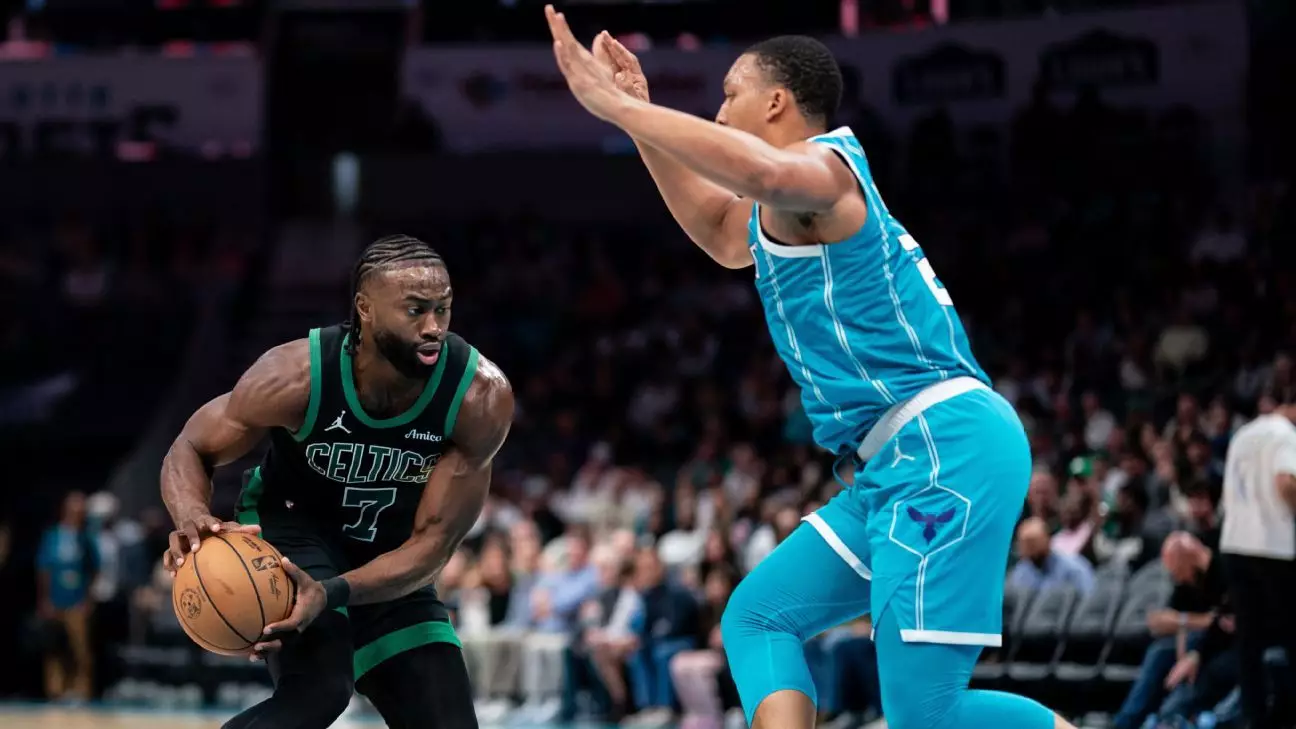In an electrifying match-up on Friday night, the Boston Celtics secured a decisive victory against the Charlotte Hornets, triumphing with a score of 124-109. While Jaylen Brown contributed significantly to the scoreline with his 25 points, the post-game narrative centered on heated exchanges rather than just numbers on the board. The intensity of competition highlighted not just athletic prowess but the underlying emotions that often accompany professional sports, particularly when former teammates collide.
The climax of this tension unfolded during the game’s final moments, leading to a controversial foul that caught everyone’s attention. The incident involved Grant Williams — a former member of the Celtics family and close ally to both Brown and Jayson Tatum — delivering a blow to Tatum while he was dribbling near half court. This was not merely an act of competitive fervor; instead, it transformed into a situation rife with animosity and potential jeopardy for Williams, who was subsequently ejected from the game. The implications of his actions might lead to a league suspension, prompting questions about player safety and sportsmanship.
Brown’s reaction to Williams’ foul encapsulated the heart of the evening’s proceedings. His immediate confrontation with Williams and vocal objection to the play underscored the protective instincts athletes embody for their teammates. This reaction represented more than just a defense of Tatum; it pointed to a deeper narrative concerning the ethics of play in the NBA. Brown’s commentary on the foul being akin to a “football play” and his assertion that “Grant know better than that” signified a breach of trust that was perceived among teammates.
The crux of Brown’s indignation lies in the intimate connections shared by players who have battled side-by-side. Williams’ assertion that the foul was unintentional further complicates the matter, introducing an interesting dilemma about intent versus impact. It pushes the discourse into uncomfortable territories, where the lines between friendship and rivalry blur under the pressure of the competitive milieu. Brown, however, suggested a fracture in what was thought to be an enduring camaraderie, inferring that Williams’ actions might reflect an unexpected shift in loyalty.
Despite the tumultuous interactions, Tatum, the player targeted in the foul, maintained a composed exterior. His decision to forgo addressing the media post-game implies a determination to focus on performance rather than drama. Celtics coach Joe Mazzulla echoed this sentiment, expressing relief at Tatum’s quick recovery and emphasizing the need to move past the incident. By acknowledging Tatum’s resilience, Mazzulla sought to reinforce the team’s collective ethos—bouncing back from adversity rather than getting engulfed by distractions.
Tensions continued to run high, with subsequent incidents, including a flagrant foul from LaMelo Ball and an ejection of Hornets forward Miles Bridges, fueling the fire. This trend of escalating physicality raises concerns over player safety and the ethics of competition in a league increasingly criticized for its enforcement of rules. Brown’s reflections on the environment characterized by teams attempting to “send messages” reveal an awareness of the psychological games at play, offering insight into how athletes must prepare their mental fortitude to navigate such pressures.
Looking Forward: A Quick Rematch
Just the day after this turbulent encounter, the Celtics are set to face the Hornets once more, now back in Boston. This rapid turnaround creates the potential for further heightened emotions, as the players confront unresolved tensions from their previous match. It’s a chance for Boston to demonstrate their unity in adversity, while also providing an opportunity for the Hornets to reassess their strategies on both a tactical and mental level.
In the world of professional basketball, this kind of drama is inevitable. Yet, it also serves as a potent reminder of the human emotions that intertwine with athletic excellence. As both teams gear up for their next encounter, the narrative will inevitably revolve around the interplay of competition, camaraderie, and the quest for victory amidst the backdrop of personal relationships. How they navigate this delicate balance will not only influence individual legacies but also the collective memory of this rivalry in seasons to come.

Leave a Reply